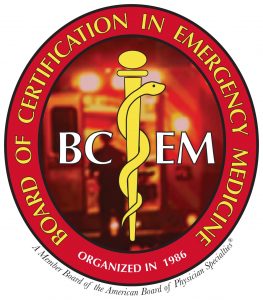Family Physicians Working in Emergency Medicine Can Distinguish Themselves With BCEM Certification
 Right now, there are thousands of family physicians working with great dedication in emergency departments across the country. Their impeccable diagnostic skills and patient care expertise should come as no surprise to members of the medical community. After all, family medicine is a multi-disciplinary specialty that includes extensive training in emergency medicine departments and requires a skill set that’s broad enough to serve a wide variety of patients.
Right now, there are thousands of family physicians working with great dedication in emergency departments across the country. Their impeccable diagnostic skills and patient care expertise should come as no surprise to members of the medical community. After all, family medicine is a multi-disciplinary specialty that includes extensive training in emergency medicine departments and requires a skill set that’s broad enough to serve a wide variety of patients.
Too often, however, potential employers overlook the emergency medicine contributions of these specialists because, unlike many of their peers, they have not completed a specific residency in emergency medicine. As a further complication, family physicians who work in emergency departments have traditionally been considered ineligible for certification in emergency medicine. So, in a time when more healthcare organizations are viewing board certification as a prerequisite for employment, these specialists may find that the road to career advancement presents one obstacle after another.
Thankfully, the Board of Certification in Emergency Medicine® (BCEM), a Member Board of the American Board of Physician Specialties® (ABPS), offers a unique opportunity for qualified family medicine physicians who have extensive experience in the ED.
BCEM Certification Expands Physicians’ Career Opportunities
BCEM certification can markedly increase a physician’s employment opportunities, says Jerry Allison, MD, FAAEP, BCEM Diplomate and emergency medicine physician leader in Dallas. “Candidates who present the BCEM credential help simplify the hiring and verification process. Certification is an added credential when presented along with other primary care physicians who do not hold this certificate.”
A BCEM-certified physician is one who has demonstrated competency in emergency medicine by passing a psychometrically sound written and oral exam. Furthermore, through BCEM certification, Diplomates improve their qualifications for leadership positions in emergency medicine and acquire credentials that strengthen their ability to prevent and fight litigation.
The BCEM Certification Process
The BCEM has developed rigorous standards to ensure that emergency medicine physicians have the requisite training and skills essential for providing exceptional medical care in the demanding environment of a bustling emergency room. To qualify for BCEM certification, physicians are required to meet stringent eligibility criteria, and they must successfully complete a comprehensive examination to attain certification. In essence, obtaining BCEM certification not only formally attests to their competency but also signifies to both patients and the general public that these committed practitioners of emergency medicine are among the most highly skilled in their profession.
Get More Information About the BCEM
To be eligible to apply for initial board certification with the BCEM, an applicant must first satisfy the general requirements of the ABPS. These include graduation from a recognized U.S. or Canadian allopathic or osteopathic college of medicine and possession of a valid and unrestricted license to practice medicine in the United States, its territories, or Canada. The BCEM has its own eligibility requirements. If you are a family physician with emergency medicine experience who wants a well-deserved career boost, contact the ABPS. We can give you information about the eligibility requirements for BCEM certification as well as more details about the advantages of earning this nationally recognized distinction.






